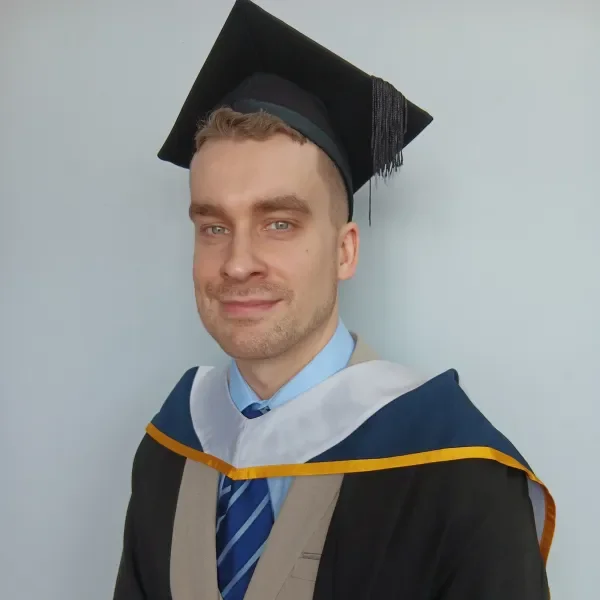Overview
Join the School of Communications, where expert educators bring their cutting-edge research and professional experience directly to the classroom.
Learn from specialists in political journalism, climate change reporting, data journalism, gender studies in media, and journalism history. Gain practical skills in news reporting, video and audio production, mobile journalism (MoJo), and news design, ensuring you're equipped for the modern media landscape.
Our state-of-the-art facilities include Mac computer labs, radio studios, and a fully equipped TV studio. Your lecturers are seasoned industry professionals, offering insights and mentorship to prepare you for real-world challenges. Plus, at the end of the academic year, you'll have a six-week internship with a media company gaining invaluable experience and connections.
Upon graduation, you'll join a distinguished alumni network that includes some of Ireland's top journalists. Your training will prepare you to thrive in newsrooms, as well as in policymaking, public affairs, broadcasting, content creation, the NGO sector, and public relations.
Why DCU
DCU People

This course appealed to me as the top journalism qualification in Ireland which would enhance my ability to work in my dream career and present me with the best possible chance of employm
Read more about Keith Kelly
Careers & Further Options
Careers
The skills you'll develop in this programmeˇŞclear, rapid and accurate writing, along with the ability to process information swiftlyˇŞwill prepare you for a diverse array of careers, extending beyond journalism.
Our programme equips you with versatile skills that open doors to a multitude of career paths, reflecting the diverse and evolving landscape of modern communication.
Our graduates have successfully ventured into various fields:
- Media: Many of our alumni excel in mainstream journalism, both nationally and internationally, across different media platforms
- Organisational Representation and Lobbying: Some graduates choose paths involving representing organisations and engaging in lobbying efforts
- Communication Roles: Our programme equips graduates for roles in general communication, be it within corporations, NGOs or government agencies
- NGO Sector: Some alumni find fulfilling careers in non-governmental organisations (NGOs)
- Corporate Communication: Graduates enter corporate communication, where they manage communication strategies for businesses
- Political Communication: Others opt for careers in political communication, working with politicians and government bodies
- Advocacy: Many alumni engage in advocacy roles for various commercial, voluntary, and public organisations
- Consultancy: Some pursue careers in consultancy, offering specialised communication advice
- Academia: For those inclined towards academia, opportunities in research and teaching are available
- Public Administration: Careers in public administration are another avenue, contributing to governance and policy development
- Information and Public Relations: Graduates also succeed in roles involving information management and public relations
"DCU graduates are highly sought after by employers. Our Graduates work in environments ranging from large multinationals to SMEs, family businesses and start-ups across every sector.
DCU Careers Service has a number of learning and development initiatives in place for our students, giving them the skills they need for a successful career path."
Entry Requirements
For admission to the MA in Journalism programme, successful applicants will have:
? A degree at the level of an Irish or UK Honours undergraduate degree (H2.2 or above) or equivalent
? Applicants with appropriate combinations of professional qualifications and experience may also be considered. This includes discipline-specific knowledge and know-how; transferable skills; basic research competency; personal effectiveness.
? Recognition of Prior Learning (RPL) applicants are required to submit a cover letter along with their application under the Transcripts section of the portal, affirming their intent to apply for RPL. For more information on RPL see here.
? International candidates who are non-native speakers of English must satisfy the University of their competency in the English language:
/registry/english-language-requirements-non-native-speakers-english-registry
Due to the specialist nature of this programme, additional criteria may be used to assess suitability to undertake this programme. For further information, please contact the Programme Chair using the contact details above
Programme Structure
DCU's MA in Journalism aims to provide students with a range of newsgathering and reporting skills, but also to equip them with critical perspectives on why journalism is important in different contexts.
Newsgathering skills are taught in two core skills-based modules, one in each semester.
In Semester 12, Journalism Practice: Writing and Reporting, focuses on news reporting techniques and on feature writing.
In Semester 2, Journalism Practice: Digital Storytelling looks at video journalism, radio journalism, and podcasting.
In both semesters, there are masterclasses featuring guest lectures from working journalists or visiting academic experts. Both modules also feature "newsdays" - newsroom simulation exercises, with students taking the roles of newsroom editors and reporters.
There are two other core (compulsory) modules, one on journalism law and ethics, and one on research methods and sources.
Students then choose two optional modules in each semester. The full course structure is set out below. Students are likely to be on campus five days a week.
Assessment is assignment-based, with 100% of grades for courses based on continuous assessment rather than exam.
Students also complete a dissertation or a journalism project, which has a deadline in late June, before embarking on an eight-week placement with a media organisation over the summer.
Semester 1
Core modules
Journalism Practice: Writing & Reporting
Research and Sources for Journalists
Optional modules
Media, Politics and the Public Sphere
Social Media, Journalism and Democracy
Science, Health and Society
Climate Change and the Media
Perspectives on Political and Business Journalism
Peace and Conflict Journalism
Semester 2
Core modules
Journalism Practice: Digital Storytelling Radio
Media Law & Ethics
Optional modules
Information, Manipulation and Democracy
Science and Health in the Media
Gender & Sexuality in Digital Culture
International News Gathering
Journalism Opportunities and Innovation
Photojournalism
Autumn semester
Core modules
Dissertation (academic thesis OR practice-based)
INTRA placement/internship
Suggested pathways
There are four suggested pathways through the programme - these pathways are informal guides to selecting your optional modules to reflect an interest in a particular journalism specialism, such as environmental, political, international, or social media journalism.
Environmental pathway
Semester 1
Core modules +
Science, Health, and Society
Climate Change and the Media
Semester 2
Core modules +
Science and Health in the Media
Information, Manipulation, and Democracy
Politics pathway
Semester 1
Core modules +
Media, Politics and the Public Sphere
Perspectives on Financial and Political Journalism
Semester 2
Core modules +
Information, Manipulation, and Democracy
Gender and Sexuality in Digital Culture
International pathway
Semester 1
Core modules +
Social Media, Journalism, and Democracy
Peace and Conflict Journalism
Semester 2
Core modules +
International Newsgathering
Photojournalism
Social Media pathway
Semester 1
Core modules +
Social Media, Journalism and Democracy
Climate Change and the Media
Semester 2
Core modules +
Information, Manipulation, and Democracy
Gender and Sexuality in Digital Culture
This scholarship offers students a competitive opportunity to apply for an INTRA workplace experience at the Washington Bureau of Arizona State University's Cronkite School of Journalism.
This programme offers training and education for people who want to enter journalism and related fields. It covers practical, theoretical, technical, and analytical aspects to prepare you for the evolving digital media landscape and the varied demands of journalism.
Once you finish the programme, you'll have the skills, deep knowledge, and understanding needed to start a successful journalism career. Whether you aim to work in digital media, television, radio, newspapers, or magazines, this programme teaches you both the ˇ°howˇ± and the ˇ°whyˇ± of journalism, and gives you a solid base from which to begin your journey into journalism.
Admission to this program requires a strong aptitude for writing, but is open to dedicated applicants from diverse academic backgrounds, spanning from science and technology to business, economics and the humanities. The admission process is highly competitive.
Here are some key highlights of our programme:
- Longstanding Legacy: We offer the oldest and most established MasterˇŻs in Journalism programme in Ireland
- Experienced Instructors: Our lecturers bring a wealth of practical experience in journalism
- Balanced Training: You'll receive a comprehensive mix of practical and theoretical training
- Media Connections: We have strong working relationships with media organisations, ensuring that our course content is relevant and up-to-date.
- Commitment to Quality Journalism: We are committed to nurturing the ongoing demand for high-quality professional journalism across all media platforms
- Research-active staff: DCU is home to the Centre for Future Journalism and Democracy (FuJo), and the DCU Centre for Climate and Society. Our colleagues are involved in real-world research around disinformation, social media, and climate change. The annual Reuters Digital News Report is also produced by a team of researchers at DCU
- International outlook: We have Faculty members from around the world, who bring global perspectives to international newsgathering techniques and the work of foreign correspondents
Fees and Funding
Fees
How To Apply
All Applicants must apply through DCU's Student Application Portal which is available here. Here's a quick step by step guide if you need help with your application:
? Provide Academic Transcripts for each and every year of study with English translation if applicable.
? All Applicants are required to include two written submissions with their application
(i) Personal statement of 500-750 words (maximum) where the applicant outlines their suitability for the programme; highlights relevant recent experiences and involvements in areas specific to the programme.
(ii) Applicants should upload ONE WRITTEN BYLINED JOURNALISM ARTICLE of circa 300 words of their own composition, on a subject and in a genre of their choice, written for a specific publication. The article may be published or unpublished.
(iii) If the article has been published, state when and in which publication. Otherwise, indicate the outlet for which you think your submission would be best suited.
(iv) Applications which include more than one sample article will be disqualified.
? If applicable, provide evidence of competence in the English language as per DCU entry requirements.
Application Deadlines
Applications will be accepted on a rolling basis until the programme is full or until the following dates:
- Closing date for non EU applicants is 1st July 2025.
- Closing date for EU applicants is 30th August 2025.
Note applicants who require a study visa for the purposes of studying at DCU, are advised to apply as early as possible.
All entry requirements should be met before the commencement of the programme.
Application Queries
For EU applicant queries, please visit /registry/eu-postgraduate-taught-admissions or email postgraduateadmissions@dcu.ie
For non EU applicant queries, please visit /registry/international-admissions-undergraduate-and-postgraduate or email internationaladmissions@dcu.ie
Commencement of Programme
The programme commences in September 2025
Life On Campus
At DCU, our students can expect a unique campus experience. We are known for our excellent teaching and learning facilities, our active clubs and societies, and our great social and sporting facilities. All this makes DCU an exciting place to be.
DCU has three academic campuses; Glasnevin, St. PatrickˇŻs and All Hallows (both in Drumcondra), all close to Dublin City centre.
They can be reached by public transport, Dublin Bus and Bus ?ireann, with our Drumcondra campuses a ten minute walk from Drumcondra Train Station. Glasnevin is a 20 minute walk from St PatrickˇŻs and All Hallows. They are also linked by Dublin Bus.
Each campus has a library (OˇŻReilly, Cregan and Woodlock Hall), study spaces, restaurants, and on-campus residencies. There are sports facilities on Glasnevin and St. PatrickˇŻs, and there is a dedicated sports campus, St ClaireˇŻs, located near Glasnevin on the Ballymun Road.
DCUˇŻs 19,000 students have access to exceptional teaching and learning facilities across our three academic campuses.
These include modern learning theatres, research centres, a new media and TV studio, radio/podcast studios, computer suites and advanced labs in the areas of Languages, Engineering, Physics, Chemistry and Biotechnology, as well as a Sports Performance centre and a training hospital ward. In 2021, we opened our first virtual reality ˇ®Leadership LabˇŻ, which is located in our Business School.
We continue to improve and update our facilities. For example, construction of a new world-class STEM facility is underway on the Glasnevin campus. With capacity for an extra 3,000 STEM students, this facility will advance DCUˇŻs international reputation for excellence in science and health, computing and engineering disciplines.
Studying in DCU isnˇŻt just about course work. The university is rich in student life and activities.
There are more than 140 clubs and societies for students in DCU, with ˇ®Clubs & SocsˇŻ days taking place on both the Glasnevin and Drumcondra campuses at the start of the academic year. They span everything from rugby to rock climbing, anime to jazz.
For many students, sport is an important part of the DCU experience. DCUˇŻs Sports Complex boasts a 25 metre swimming pool, fitness centre gym, all-weather pitches and squash courts, as well as soccer, GAA and rugby pitches. DCU D¨®chas ?ireann, the universityˇŻs GAA club, is the largest third level Gaelic Games club in the country. Meanwhile, DCU Athletics has been IrelandˇŻs highest achieving university club for many years. And DCU has dozens of other clubs to get involved in, from Archery to Weightlifting.
The Glasnevin campus is home to our purpose built, state-of-the-art student centre, The U, which serves the needs of a rapidly growing student body. Here, you will find the Student Leadership and Lifeskills Centre, performing arts and cultural spaces for students and the wider community, and the Entrepreneurship and Innovation Hub. Also located on our Glasnevin campus is The Helix, our renowned performing arts centre.
On our St PatrickˇŻs campus, we have the Java Student Hub, a vibrant, warm and welcoming space where students can meet for coffee, play music, use the projector to watch events, or just relax. The walls of the Java Hub were designed based on the cultural history of St PatrickˇŻs Campus, including the special references to the notable sporting history and history of the arts.
We have a number of academic, professional and social supports for students.
Student Advice & Learning Skills Centre - Offers a wide range of supports and services to students and advice
The Writing Centre - drop-in writing workshops for students through the academic year
Maths Learning Centre - provides maths support for students of all ability levels with maths modules
Student Learning - facilitate the transition from passive to active learning for students at DCU, by teaching study skills, nurturing critical thinking and building student confidence.
Careers work with students to help them on their professional journey into graduate employment.
Our student support team offers a comprehensive support programme, helping students make that all important transition into university life and focusing on building confidence and skills which are key to success at third level.

DCU Glasnevin Campus
FAQs
Is DCU all one campus?
DCU is a multi campus university - the Glasnevin, St Patrick's and All Hallows campuses. The St Patrick's campus is where the Education courses are taught and some of the subjects from the BA Joint Honours degree. There is a 20-25 minute walk between the campuses but there are buses and bikes available to go between them also.
´ó·˘ĚĺÓýÔÚĎß_´ó·˘ĚĺÓý-Ͷע|ąŮÍř here to see maps of all of our campuses
If I'm studying on the St Patrick's campus, can I use the library and sports centre on the Glasnevin campus?
Yes, all facilities such as sports and accommodation are open for all DCU students to avail of.
Are there libraries in DCU and if they have wifi and work stations?
We have a brand new state of the art four floor library on our St. Patrick's Campus which complements the existing library on the Glasnevin campus. There is free wifi, work stations as well as desktop computers.
Does DCU provide accommodation?
DCU does have on-campus accommodation for undergraduate and postgraduate students, and you can find out more and apply via the Accommodation Office webpage.








